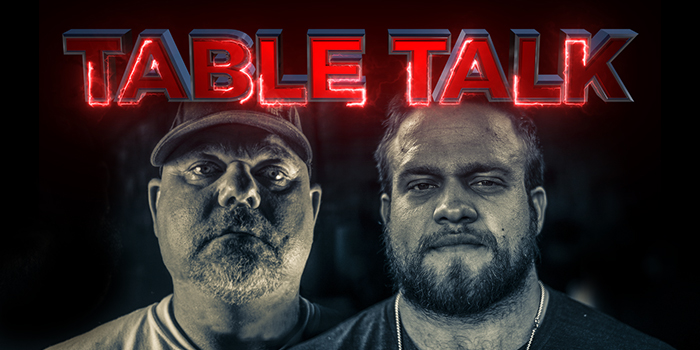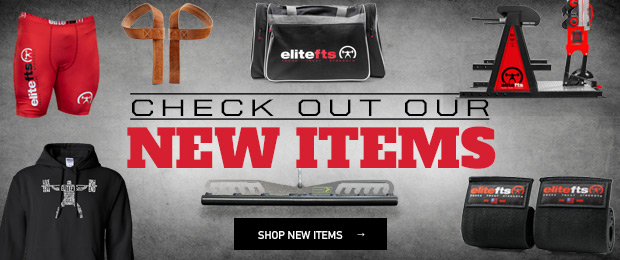
Dave Tate’s gotten a ton of questions about the future of powerlifting. That said, we’re going to narrow it down to one:
"Where is powerlifting going to be in 10 years?"
Keep in mind that Joe Sullivan and Dave have very different experiences and perspectives, as their competitive times never even overlapped, so these are vastly different time periods in the sport.
Dave tosses a couple variables out of this question and off of the table: Squat depth, judging, federations, and weigh-ins. These are things that are probably always going to be debated in the sport, regardless of what happens.
"I call those items right there... that is part of the sport culture. It’s not gonna change. It kinda makes it what it is. I kinda like that it’s in there because it always leaves something to talk about, bitch about, rant about, and it’s never as widespread as people make it out to be."
As for the future of powerlifting in the next 10 years, Dave suggests looking back to the start of the sport and looking at the changes that have been made in 10-year blocks. The changes have been substantial. Dave’s seen the IPF associated with three different American federations. Sure, we could go around claiming that the USAPL is going to be the best in the next 10 years, but who knows if the IPF is even going to be associated with the USAPL? That wasn’t the case 10 years ago.
Also, for those of you who want Dave to start getting into the raw versus geared debate, sorry — he’s not going to get into that. But he does make an important point based on the shift from raw to gear and vice versa:
"The athletes have way more control than what they think they do. They do vote with where they compete. They really do."
He also addresses the growth of training like a powerlifter. Not everyone who powerlifts is necessarily going to be competing, and that seems to be the majority from what Dave’s seen recently. Sure, the sport isn’t the size of high school football, but it’s growing. It’s bigger than Dave’s ever seen it before. Way bigger. At least visually. But with growth comes more problems — and the opportunity for people to monetize.
Ten years ago, a powerlifting coach was the old beat-up dude in a gym who’d teach people the lifts in his basement. Now we’re starting to see more and more online coaching. Anyone can hire an online coach. Again, Dave’s not going to get into the debate if that’s good or bad — but he points out that wouldn’t even be a thing without growth. But this also means a drop in quality due to the higher quantity of coaches. You might just have to dig harder and deeper for better coaches, but there’s still more coaches out there, period, good and bad.
Same goes for meet directors. Ten years ago, most meet directors assumed they wouldn’t make money. They’d get lucky if they broke even. And now it’s an income source. All a meet director has to do is pack a gym full of lifters and bam! Money!
Currently, it’s less about people training and hosting meets for the love of doing it, but for the income. Again, that doesn’t mean that there aren’t people who do it for the love of the sport and for money.
"People wanted the sport to get bigger, right? That was everyone’s goal: We want to grow the sport, we want to grow the sport! But no one stopped to think what’s gonna happen with the growth."
The issues people need to concern themselves with the growth, not cultural issues, though Dave has a feeling competition might just take out some of the issues. If there are shitty trainers, they’re not going to be around for long. That’s business, folks.
As for what powerlifting will look like in 10 years? Dave admits he has no idea and can’t even predict that. That’s why he tells his lifters “not to look behind the curtain.” Focus on the present and keep training. If you look behind that curtain, you’re not going to like what you see and it’s going to piss you off. So don’t look.
As a current competitive lifter and coach, Joe sees powerlifting looking more and more like a customer service industry. It’s putting your money where your mouth is.
For example, Joe knows of a one-day meet with 500 lifters and only five platforms with an entry fee of $175. (And no, he’s not going to name names.) That is not for the lifters, and you sort of have to know that’s not for lifters. That won’t stop people from signing up, but you have to sit down and think about it.
If you believe in a certain type of lifting or service, feed into it. Pay for it. Support it.
The IPF has been trying to get powerlifting into the Olympics since forever, and Joe’s take? It’s not going to happen. If you ask Joe, weightlifting is more likely to get pushed out of the Olympics before powerlifting ever gets in. There’s already a barbell sport plagued with drug use and drug failures. Why would they put powerlifting in that? He doesn’t think that’d be good for the sport.
But what Joe would like to see are bigger meets with bigger prize monies going to the lifters, which would (in his eyes) turn it into a more legitimate sport instead of a hobby that people dump cash into because they love it.
Dave says that one ridiculously huge meet had better have prize money. Joe assures him there’s prize money, but it’s nowhere near where it should be, especially compared to how much money the meet director’s running off with.
Still, it’s not all bad. Joe shares a slightly different view than people being in it only for money or love of the sport. He knows people who love powerlifting so much that they’ve quit their day jobs to become online coaches. They combine what they love into something they can be paid for. Joe suggests taking this with a grain of salt. Even if you love what you’re doing, you might not be the best at it. And like Dave, Joe thinks that the best ones will power through and the worst will vanish:
"It is still our responsibility to everyone watching this video, everyone competing, everybody that reads the articles on this site, support the people that support you. If you believe this particular federation, meets, coach, gym, whatever, if they have your best interests at heart and want you to succeed, stick with them. Support them. Do it wholeheartedly. If they don’t, you shouldn’t be with them. They shouldn’t be around."
This growth could still be a trend, though, so enjoy what you can, while you can.
Dave, being the old school lifter that he is, hopes that today’s meet directors are like the ones he knew: they were also powerlifters at some point or another. Having someone who knows the sport makes the experience better for everyone there.
As sports move up in caliber, it’s a different world because the number of people who can do it decreases tremendously. If you don’t know that world’s rules, that can put you in trouble. The last thing you’d want to be is the meet director of a Fyre Festival version of a powerlifting meet.
"You have to walk the walk at some point. If you don’t know what it’s like to be under a weight or at least near a weight that could legitimately injure you or end your life, it’s very hard to get a person that is doing that to be able to relate to you or listen to you."











First, who would pay that much to compete? National and world entry meet fees aren't that much.
Second, where did they hold the meet that they would need to charge that much, Madison Square Garden?